To Be Twenty in the Aures
04/30/2018
France / 1972 / French & Arabic
Directed by René Vautier
With Alexandre Arcady, Philippe Léotard, Hamid Djellouli
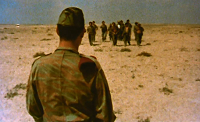 A hard-nosed lieutenant named Perrin, between stints in Indochina and Chad (he seems to be following France’s colonial disasters as they topple) has found himself, unfortunately, in Algeria. Perhaps his superiors hate him, because he has been inexplicably put in charge of a company of scraggly young men from Brittany who were sent off to be rifle fodder as punishment for having protested the war. They stand in front of him after three months stuck on a remote desert base, having seen no action. Miserable and no doubt smelly, they look restless and not at all happy to see him. He is greeted with a volley of derisive jokes and is serenaded with a raucous drinking song, but he is ready for it.
A hard-nosed lieutenant named Perrin, between stints in Indochina and Chad (he seems to be following France’s colonial disasters as they topple) has found himself, unfortunately, in Algeria. Perhaps his superiors hate him, because he has been inexplicably put in charge of a company of scraggly young men from Brittany who were sent off to be rifle fodder as punishment for having protested the war. They stand in front of him after three months stuck on a remote desert base, having seen no action. Miserable and no doubt smelly, they look restless and not at all happy to see him. He is greeted with a volley of derisive jokes and is serenaded with a raucous drinking song, but he is ready for it.
Even though the risk of a mutiny with these types is quite apparent to Perrin, he is determined to make the arrangement work, and to get out of it alive. He first takes the men into a fish-in-a-barrel situation, intentionally, to have them shot at and traumatized. Their fear and inexperience makes it a nightmare, their guns going off by accident and without clear targets. But… “then we started aiming,” recalls one soldier, “and got used to it.” When one of them, the stammering Coco, goes momentarily missing, the men grab the first local man they see and beat him to death (or half-to-death), suspecting him of some malfeasance. Coco then reappears, having only gotten lost.
Individually, the conscripts recount the awful things that they did. One watches the entry of a rude cave dwelling while another soldier rapes a woman who lives there. Then, afterward, the lookout goes in for his turn. We see a child running, his back to the sniper’s sights many yards away. After the burst of fire, the kid falls down, and “he would be a terrorist in ten years.” The justification sounds familiar; we could be in Iraq, Afghanistan, or in any Hollywood film about the anguish of men at war. Although these soldiers don’t seem especially bothered, so thorough has been their transformation. One of them talks about sending the valuables he’s stolen back home, but having them rejected by his father.
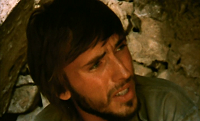 The young men have become little more than marauders, pillaging what meager wealth they can kill people for, and taking anything they can find, even if it isn’t of use. Their confessions express confusion with the morality learned at home versus its meaninglessness in Algeria. On one hand, they can’t articulate the violence and disorder that they are now living in. But on the other hand, their bewilderment is rendered in very stark, easily-illustrated ways. As a result it comes across rather simplistically. What does seem quite authentic are the chaotic arguments and stupid jokes, both of which fly about the company endlessly. Director Vautier turns up the feeling of affected cynicism with the soundtrack, largely comprised of acoustic songs that sarcastically lampoon the life and death of the soldiers.
The young men have become little more than marauders, pillaging what meager wealth they can kill people for, and taking anything they can find, even if it isn’t of use. Their confessions express confusion with the morality learned at home versus its meaninglessness in Algeria. On one hand, they can’t articulate the violence and disorder that they are now living in. But on the other hand, their bewilderment is rendered in very stark, easily-illustrated ways. As a result it comes across rather simplistically. What does seem quite authentic are the chaotic arguments and stupid jokes, both of which fly about the company endlessly. Director Vautier turns up the feeling of affected cynicism with the soundtrack, largely comprised of acoustic songs that sarcastically lampoon the life and death of the soldiers.
After a skirmish with two fighters and two unarmed women on a rocky slope, the company winds up with a prisoner, plus one of their own dead, and one wounded – all three of whom they transport to a hideout in an abandoned village. The injured man, left with a gangrenous leg wound and propped up in a stone shelter, proves the most articulate of them all, bemoaning the similarities between the insurgents and the poor boys sent over to fight them. “Under the uniform, they are just proletarian children,” he says tearfully, to no one in particular. Perrin delivers a speech to him as a retort, a somewhat useless one as he is about to be transported away from the war, to a hospital, and eventually home. The lieutenant makes it clear that he has no time for pacifism, for unions or a politically-conscious proletariat. He says he only knows working class people as the uniformed bozos who get sent over into his care.
The film is set in April of 1961, and an event happens that is somewhat perpendicular to the discussion of occupying force and resistance fighters: an attempted coup (it’s referred to as a “putsch” because it technically happened on French soil and not in a foreign country) suddenly turns the officer class to the cause of independence. This isn’t a self-determination revolution, but a right-wing bid to take over France starting from Algeria. It doesn’t go through, getting quelled in a matter of days, but it affects the war by turning the soldiers against their commanding officers. Vautier injects the film with scenes of the men listening pensively to broadcasts from de Gaulle, who implores them all to resist the generals staging the coup. As a result of the wide-spread use of transistor radios, there were mini-insurrections within the isolated detachments in the Atlas mountains and throughout the colony. The men decide to tie up Perrin and declare hierarchy to be over with. However their fate has become uncertain; the helicopter they’ve been waiting for, to transport the wounded teacher, can’t arrive due to a closure of airspace.
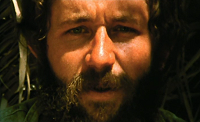 As Perrin, tied with ropes in a crouching position, moves his legs rhythmically to stave off deep vein thrombosis, it looks almost as if he is tapping his foot to one of Yves Branellec’s protest songs, which calls a roll of France’s recent imperial blunders. Meanwhile Robert, the teacher, has worsened to the point that he is muttering incoherently and becoming hypnotized by the Berber carvings on the cave’s ceiling. They decide to do away the prisoner they’ve been keeping, but not before having a little fun: they tie him to a windmill tower in a crucifixion pose, and leave him in the hot sun. And when they finally get a chance to bury their friend killed in the earlier fracas, no one feels like saying a eulogy. So they all just walk away. The perceived requirement of sentimentality drains away quickly when they all realize it isn’t necessary.
As Perrin, tied with ropes in a crouching position, moves his legs rhythmically to stave off deep vein thrombosis, it looks almost as if he is tapping his foot to one of Yves Branellec’s protest songs, which calls a roll of France’s recent imperial blunders. Meanwhile Robert, the teacher, has worsened to the point that he is muttering incoherently and becoming hypnotized by the Berber carvings on the cave’s ceiling. They decide to do away the prisoner they’ve been keeping, but not before having a little fun: they tie him to a windmill tower in a crucifixion pose, and leave him in the hot sun. And when they finally get a chance to bury their friend killed in the earlier fracas, no one feels like saying a eulogy. So they all just walk away. The perceived requirement of sentimentality drains away quickly when they all realize it isn’t necessary.
The incidents in the film are based in hundreds of hours of testimonies from French conscripts to the Algerian war of independence. The opening statement claims that each scene was verified by at least five former soldiers. While it has its roots in Vautier’s own involvement in the Algerian independence struggle, he was mostly too arty to take a “direct cinema” approach. An documentary that came out that same year, Winter Soldier, also addresses firsthand accounts of combat. The collective who produced it filmed the press conference of returned veterans participating in a massive investigation into American war crimes in Vietnam. While that film was very current, in addition to being anti-war, Vautier’s film was done ten years after the cease-fire between France and the FLN was declared. While many of Vautier’s films were banned for some period of time, Winter Soldier went largely unseen, at least outside activist circles, due to mainstream skepticism. Censorship works differently in America – it’s generally via consensus rather than outright prohibition.
Perhaps To Be Twenty in the Aures was made at a safe enough distance from the events it depicts, and also after Gillo Pontecorvo’s The Battle of Algiers (1966) – considered a defining dramatization of the war – was no longer banned in France. (That earlier film was also attacked in an overwrought campaign by the Cahiers du cinema crowd, presumably since it assumes an actually militant point of view). But that doesn’t mean that the public and the press were ready to wholly acknowledge the abuses that had been committed in the fight to uphold colonialism. It was still largely taboo, and the film notes that the ordinary soldiers, mentally ruined by combat, just weren’t talked about. The value of Vautier’s film is in frankly compelling the nation and its apologists to look at what had been done in its name. That which happens in his film happened thousands of times over in different scenarios, and those crimes were, at the time, continuing throughout the world, in Vietnam, Angola and elswhere.
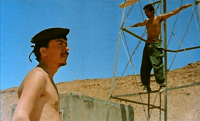 Both Winter Soldier and this film end up focusing on specific war crimes committed by grunts in the field, but the notion that war itself is a crime is only vaguely communicated. Perhaps this is because, in the context of the time and the state of anti-war activism, this position was a given. But the approach hasn’t aged well. As straightforward-seeming and focused as To Be Twenty in the Aures appears, its attempt to reenact the muddled consciousness of its characters results in an equivocal film. The only character who speaks with any authority in it is the lieutenant, a career soldier seemingly damned to purgatory with a group of long-haired yahoos. He makes it clear from the outset that he has had done with discipline, and since they have never known it to begin with, the far right and the far left have found common cause: kill or be killed – outlive your sentence with limbs intact.
Both Winter Soldier and this film end up focusing on specific war crimes committed by grunts in the field, but the notion that war itself is a crime is only vaguely communicated. Perhaps this is because, in the context of the time and the state of anti-war activism, this position was a given. But the approach hasn’t aged well. As straightforward-seeming and focused as To Be Twenty in the Aures appears, its attempt to reenact the muddled consciousness of its characters results in an equivocal film. The only character who speaks with any authority in it is the lieutenant, a career soldier seemingly damned to purgatory with a group of long-haired yahoos. He makes it clear from the outset that he has had done with discipline, and since they have never known it to begin with, the far right and the far left have found common cause: kill or be killed – outlive your sentence with limbs intact.
Ultimately the flimsiness of morals expressed in the film are a commentary on the unfocused left, how easily they transition from objectors (“conscientious” may be too generous a word here) to wild ronin cavorting through the mountains, engaging in sadistic folly to counteract the cruelties inflicted on them. Perrin keeps trying to find causes that will motivate them to kill and plunder (to do, in other words, what trained soldiers do), namely revenge: for their dead comrade, for the wounded teacher, for three generations of Pieds-Noir – the latter having gone from being reviled in France to being perceived as noble victims. In spite of its sardonic title and adherence to the crude dichotomies of idealism and brutality, the film manages genuine and blunt observations about the dynamics of counter-insurgency. “For each body they find and bury, ten of them will want to shoot us,” one soldier complains. “We’re turning them into fighters.”
To Be Twenty in the Aures was produced by Vautier’s UPCB, a militant collective based in Brittany. It leans heavily on the Breton identity of its characters – “half Breton, half soldier,” one of the songs on the soundtrack laments – assuming a double tragedy, since they’re ancillary to the center of imperial power but get sacrificed for it. However their situation isn’t at all comparable to that of the so-called harki soldiers (Algerians conscripted to fight for the French). One of Perrin’s stories that he relates to the company, in which he tortured and disemboweled an FLN spy to set an example, hints at a much darker experience for the locals. Vautier tries, though, to fix the one-sidedness of it; an interlude shows what is apparently newsreel footage (colorized to match the rest of the film) of people escaping the fighting and people who weren’t able to get out in time, set to haunting Berber chants sung by Taos Amrouche. Suddenly these aren’t specific atrocities committed by this one group but the horrors of war in general – massacres, displacement, poverty and starvation.
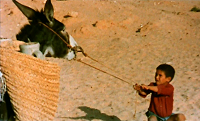 One strange, protracted passage has the comparatively thoughtful soldier Noël (called “Nono”), under cover of darkness, untying the enemy fighter they had crucified, a young man named Youssef. He doesn’t just set Youssef free, but absconds with him, along with two guns and a pack of supplies. This startling defection doesn’t make things any more clear-cut; certainly Nono is more idealistic and brave than any of his friends in the commando, all of whom, in various forms, have allowed themselves to be coerced into dumb brutality. But also he doesn’t seem to have any more vision than the others, either. It’s as though he is trying to atone for something, some sins committed here and back home. Earlier Perrin had berated his pacifism, asking him, “you think you’re going through war clean, without blood on your hands? You act holier-than-thou. At least we own what we do.” The lieutenant is not only lambasting people who don’t want to fight, but also the complicity of those in France who oppose imperialism, and yet live off of its spoils. To him, war is the only thing that is real, and it doesn’t tolerate moralizing.
One strange, protracted passage has the comparatively thoughtful soldier Noël (called “Nono”), under cover of darkness, untying the enemy fighter they had crucified, a young man named Youssef. He doesn’t just set Youssef free, but absconds with him, along with two guns and a pack of supplies. This startling defection doesn’t make things any more clear-cut; certainly Nono is more idealistic and brave than any of his friends in the commando, all of whom, in various forms, have allowed themselves to be coerced into dumb brutality. But also he doesn’t seem to have any more vision than the others, either. It’s as though he is trying to atone for something, some sins committed here and back home. Earlier Perrin had berated his pacifism, asking him, “you think you’re going through war clean, without blood on your hands? You act holier-than-thou. At least we own what we do.” The lieutenant is not only lambasting people who don’t want to fight, but also the complicity of those in France who oppose imperialism, and yet live off of its spoils. To him, war is the only thing that is real, and it doesn’t tolerate moralizing.
Nono may indeed have a long, subversive plan to join the independence fighters, but it doesn’t become apparent, and he certainly doesn’t know what he’s getting into. His good deed ultimately gets him killed (just as Perrin has predicted), when he gets gunned down by Youssef’s younger brother, who mistakes him for an assailant. Predictably, this human tragedy gets spun into propaganda by the lieutenant; he says they must have revenge for what happened. It’s both a morale-killer and a fresh injection of blood-lust. The only way to make them shoot is to make the fight personal. Like the clueless people back home, their perspective gets skewed by the way events are characterized. In the sudden reality of warfare, the only human beings now are the white ones, and everyone else is a target, a threat or a plaything.
Although the film can’t entirely escape its resemblance to Luc Moullet’s A Girl Is a Gun (1971) and The Smugglers (1967), low-budget new-wave romps that do a semi-okay parody of Westerns, Vautier deserves his reputation as a politically-committed director, plus considerably more recognition than he has gotten. His better films – such as Africa 50 (1950), done when he was 21 – are both revolutionary and lyrical, not only running counter to discourses of power but actively subverting them, with brio. Certainly his militant credentials eclipse supposedly radical filmmakers like Godard or Truffaut, whose involvement in far-left politics now seems more about self-aggrandizement than contributing to any particular cause.
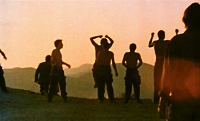 Nicole Brenez compares Vautier’s films to “weapons in a resistance movement,” writing that, “they are used, exchanged, lent, discarded, destroyed, lost or hidden away and sometimes long forgotten.” The relatively indistinct impact of a contemporary viewing of To Be Twenty in the Aures, well past the heyday of Vautier’s underground environs, has to do with how slight and provincial its purview is. Even more so because it is literally about the Breton experience in Algeria. Like Winter Soldier, it depicts things that, even well after the fact, were little-discussed or acknowledged in the national discourse – but it also does so through the rather opaque lens of the occupiers’ experience, unlike The Battle of Algiers, which at least attempts to show things from the Algerian side.
Nicole Brenez compares Vautier’s films to “weapons in a resistance movement,” writing that, “they are used, exchanged, lent, discarded, destroyed, lost or hidden away and sometimes long forgotten.” The relatively indistinct impact of a contemporary viewing of To Be Twenty in the Aures, well past the heyday of Vautier’s underground environs, has to do with how slight and provincial its purview is. Even more so because it is literally about the Breton experience in Algeria. Like Winter Soldier, it depicts things that, even well after the fact, were little-discussed or acknowledged in the national discourse – but it also does so through the rather opaque lens of the occupiers’ experience, unlike The Battle of Algiers, which at least attempts to show things from the Algerian side.
Like in countless mainstream films to come, we’re meant to feel bad for the poor soldiers forced to commit atrocities; there’s something unwittingly prescient in it. But both films (Vautier’s and Winterfilm Collective’s) do strive to communicate the causes for such crimes, and how they’re passed from the top down. They just come out looking indefinite about what stance to take regarding the experience – fittingly, since both are told from the point of view of twenty-year-olds. Vautier’s film is significantly less sentimental about the ordinary grunts (and, by extension, working class young men), mainly making them out to be boorish dweebs rather than the keepers of a distressed morality. This is interesting, because it’s no doubt a reflection of the activist context that Vautier came up in during the 1950s and 60s, when the war was going on. The film is indeed, as Brenez put it, a weapon, but against one aspect of imperialism. The psychological toll of the situation becomes the only theme, and the experience of the Algerian freedom fighters and the unfortunate civilians trying to live there is treated as a background abstraction, like a mountain range or a sunset.